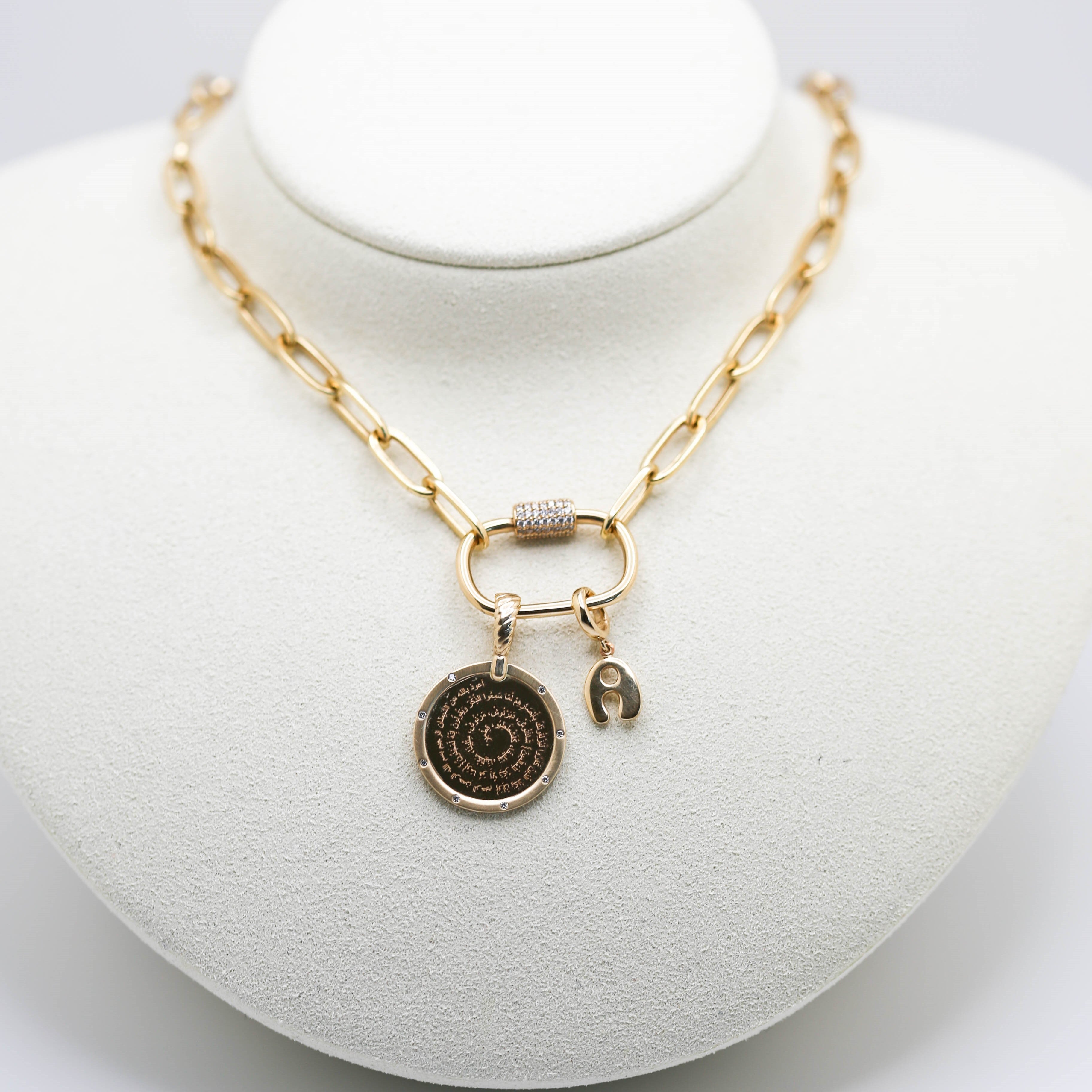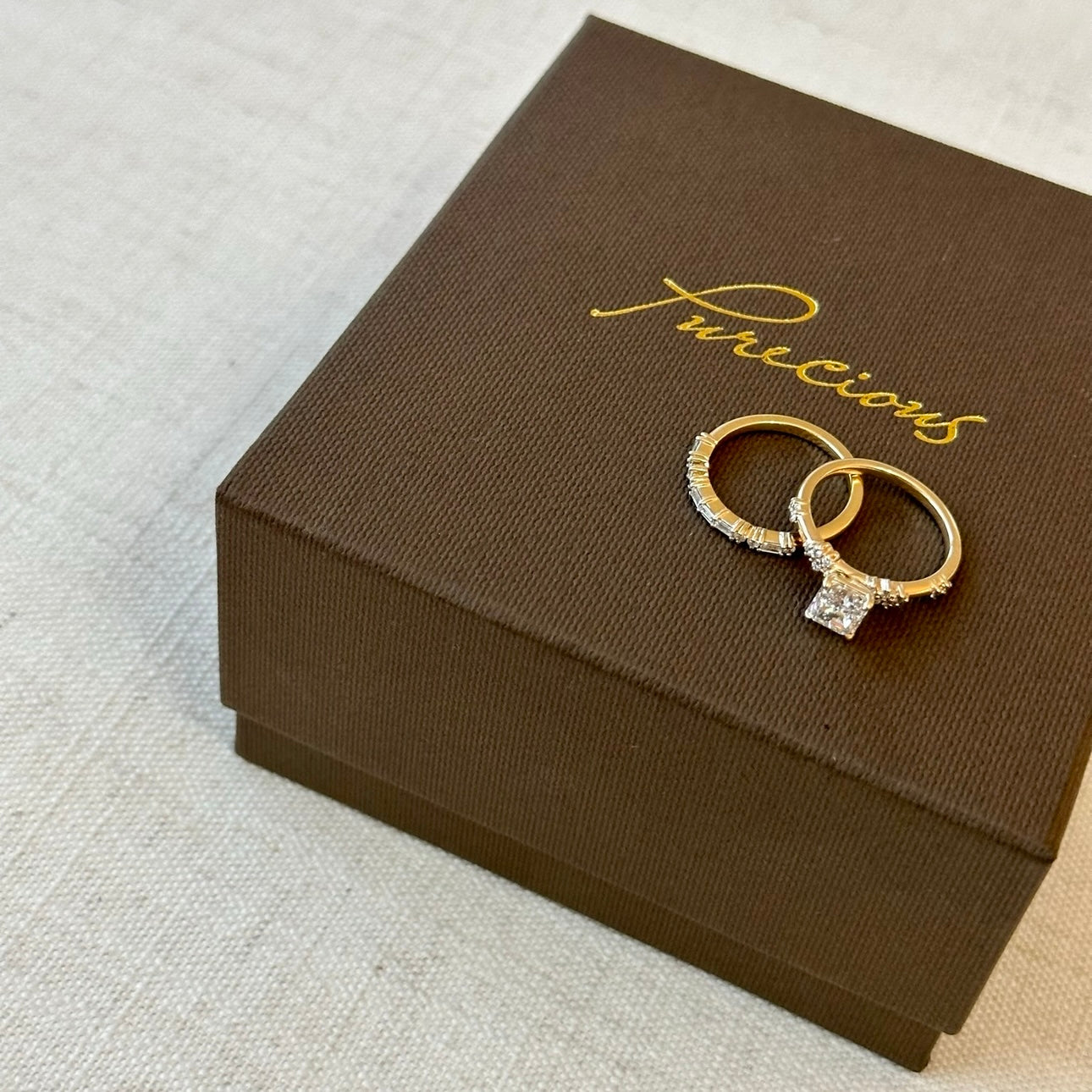Kitmir pendant is a symbol for seeking a divine protection from oppression and disbelief.
أعوذ بالله من الشيطان الرجيم بسم الله الرحمن الرحيم اَللّٰهُ لَٓا اِلٰهَ اِلَّا هُوَۚ اَلْحَيُّ الْقَيُّومُۚ لَا تَأْخُذُهُ سِنَةٌ وَلَا نَوْمٌؕ لَهُ مَا فِي السَّمٰوَاتِ وَمَا فِي الْاَرْضِؕ مَنْ ذَا الَّذٖي يَشْفَعُ عِنْدَهُٓ اِلَّا بِاِذْنِهٖؕ يَعْلَمُ مَا بَيْنَ اَيْدٖيهِمْ وَمَا خَلْفَهُمْۚ وَلَا يُحٖيطُونَ بِشَيْءٍ مِنْ عِلْمِهٖٓ اِلَّا بِمَا شَٓاءَۚ وَسِعَ كُرْسِيُّهُ السَّمٰوَاتِ وَالْاَرْضَۚ وَلَا يَؤُ۫دُهُ حِفْظُهُمَاۚ وَهُوَ الْعَلِيُّ الْعَظٖيمُ
Translation:
“Allah! There is no god ˹worthy of worship˺ except Him, the Ever-Living, All-Sustaining. Neither drowsiness nor sleep overtakes Him. To Him belongs whatever is in the heavens and whatever is on the earth. Who could possibly intercede with Him without His permission? He ˹fully˺ knows what is ahead of them and what is behind them, but no one can grasp any of His knowledge—except what He wills ˹to reveal˺. His Seat encompasses the heavens and the earth, and the preservation of both does not tire Him. For He is the Most High, the Greatest.”
It contains a very clear and concise explanation of Allah's sovereignty. There are hadiths regarding its virtue and reward. In summary: “The greatest verse in the Quran is Ayatul Kursi. Whoever recites it, Allah sends an angel at that hour to record their good deeds and erase their sins until the next day. The house in which it is recited is abandoned by Satan for 30 days. For forty days, neither magic nor magicians can enter that house. O Ali, teach this to your children, family, and neighbors.'"
This translation conveys the emphasis on the significance of Ayatul Kursi in Islamic tradition, highlighting the believed spiritual benefits and protections associated with its recitation, as narrated in various hadiths.
2. The Nazar(evil eye)/protection verses from the Quran, which are verses 51-52 from Chapter 68, Qalem(Pen)
أعوذ بالله من الشيطان الرجيم بسم الله الرحمن الرحيم {وَإِنْ يَكَادُ الَّذِينَ كَفَرُوا لَيُزْلِقُونَكَ بِأَبْصَارِهِمْ لَمَّا سَمِعُوا الذِّكْرَ وَيَقُولُونَ إِنَّهُ لَمَجْنُونٌ}{وَمَا هُوَ إِلاَّ ذِكْرٌ لِلْعَالَمِينَ}
(51) The disbelievers would almost cut you down with their eyes when they hear ˹you recite˺ the Reminder, and say, “He is certainly a madman.”
(52) But it is simply a reminder to the whole world.
These verses discusses the reactions of the polytheists who listened to the Quran as recited by the Prophet Muhammad. Their eyes (gazes), which were likened to piercing arrows, are used to depict their negative emotions like hatred, envy, and jealousy towards him. Overwhelmed by the literary excellence of the Quran and unable to find any fault in its language or content, these polytheists started propagating that the Prophet was a madman not to be trusted, in an effort to undermine the attention and interest he was garnering. However, Allah Almighty, by elucidating the superior qualities of the Quran, nullified their negative propaganda.
When the polytheists saw the Prophet, their eyes reflected intense jealousy and hostility as if they were shooting arrows at him with their gaze. Verse 51 is said to describe this psychological state. Although there is a common belief that this verse relates to the evil eye, it is not based on definitive knowledge. As conveyed by Sheikh Al-Shawkani (Vol. 5, p. 319), the multi-faceted scholar Ibn Qutaybah did not interpret this verse as the polytheists casting an evil eye on the Prophet. Rather, he understood it as describing their feelings of animosity and hatred when the Prophet recited the Quran. Thus, even if there are other evidences regarding the evil eye, this verse is not directly related to it.
3. Ashab-i Kehf (The Companions of Cave / 7 sleepers)
"Ashab-i Kehf" refers to the same group of individuals known as the "Seven Sleepers" in Christian tradition. This term is used in Islamic tradition, particularly in the context of the Quran. The story of Ashab-i Kehf is mentioned in Surah Al-Kahf (The Cave), which is the 18th chapter of the Quran.
In the story, the young men, seeking to preserve their monotheistic faith(Christianity at that time), retreat to a cave to escape persecution at the hands of a tyrannical king. God protects them by making them fall into a deep sleep that lasts for centuries(309 years). When they awaken, they find that the society around them has changed and now embraces monotheism.
This story in Islam emphasizes themes of faith, divine protection, the mystery of the passage of time, and the transient nature of worldly power. The exact number of sleepers and their names are not specified in the Quran, however, Islamic scholars and traditional stories have assigned names to them based on various historical and religious texts. Narrated by Ibn Abbas, the most commonly cited names are:
- شَاذَنُوشْ (Shazenush)
- دَبَرْنُوشْ (Dabarnush)
- مَرْنُوشْ (Marnush)
- مِثْلِينَا (Misleena)
- مَكْثَلِينَا (Maksaleena)
- يَمْلِيخَا (Yamleekha)
- كَفَشْطَطِيُو (Kafeshtatiyu)
- قِطْمِير (Qitmir, Kitmir, or Ketmir) Name of the dog that accompanied them in the cave.
The message intended to be conveyed to believers through the story of the People of the Cave, as succinctly narrated in the Holy Quran, is fundamentally that the struggle between faith and disbelief has always existed. Despite being subjected to oppression in every era, the truth has never been overcome by falsehood. Those who sincerely believe and live according to their faith are surely led to success by Allah. Ultimately, it underscores that Allah, who created everything from nothing, is certainly capable of resurrecting humans.
Quran, chapter 18: The Cave ( Al-Kahf )
This Meccan sûrah takes its name from the story of the people of the
cave in verses 9-26. According to Ibn ’Abbâs, the Prophet ( صلى الله عليه وسلم ) was
asked about the youths who hid in a cave, a king who dominated
large parts of the world, and about the spirit, so 18:9-26, 18:83-99,
and 17:85 were revealed. The Prophet ( صلى الله عليه وسلم ) says in an authentic
narration collected by At-Tirmiⱬi, “No one’s feet will move on
Judgment Day until they are asked about four things: 1) What they
did in their youth. 2) How they earned and spent their wealth. 3)
What they did with their knowledge. 4) And how they spent their
lives.” Interestingly, these four questions correspond to the four
stories mentioned in this sûrah: 1) The story of the youths and the
cave. 2) The story of the wealthy man with two gardens. 3) The story
of Moses and the man of knowledge. 4) And finally the story of ⱫulQarnain and his life and travels in the service of Allah. The four
stories are interjected by warnings to the disbelievers and good
news to the believers. Like the story of the people of the cave, some
miraculous stories appear in the next sûrah.
In the Name of Allah—the Most Compassionate, Most Merciful
Message of the Quran
- All praise is for Allah Who has revealed the Book to His servant,
[543] allowing no crookedness in it, 2. ˹making it˺ perfectly upright, to
warn ˹the disbelievers˺ of a severe torment from Him; to give good
news to the believers—who do good—that they will have a fine
reward, 3. in which they will remain forever; 4. and to warn those
who claim, “Allah has offspring.” [544] 5. They have no knowledge of
this, nor did their forefathers. What a terrible claim that comes out of
their mouths! They say nothing but lies.
Be Steadfast
- Now, perhaps you ˹O Prophet˺ will grieve yourself to death over
their denial, if they ˹continue to˺ disbelieve in this message. 7. We
have indeed made whatever is on earth as an adornment for it, in
order to test which of them is best in deeds. 8. And We will certainly
reduce whatever is on it to barren ground.
Story 1) The People of the Cave
- Have you ˹O Prophet˺ thought that the people of the cave and the
plaque [545] were ˹the only˺ wonders of Our signs? 10. ˹Remember˺
when those youths took refuge in the cave, and said, “Our Lord!
Grant us mercy from Yourself and guide us rightly through our
ordeal.” 11. So We caused them to fall into a dead sleep [546] in the
cave for many years, 12. then We raised them so We may show
which of the two groups would make a better estimation of the length
of their stay. [547]
Standing up for the Truth
- We relate to you ˹O Prophet˺ their story in truth. They were
youths who truly believed in their Lord, and We increased them in
guidance. 14. And We strengthened their hearts when they stood up
and declared, “Our Lord is the Lord of the heavens and the earth.
We will never call upon any god besides Him, or we would truly be
uttering an outrageous lie.” 15. ˹Then they said to one another,˺
“These people of ours have taken gods besides Him. Why do they
not produce a clear proof of them? Who then does more wrong than
those who fabricate lies against Allah? 16. Since you have distanced
yourselves from them and what they worship besides Allah, take
refuge in the cave. Your Lord will extend His mercy to you and
accommodate you in your ordeal.”
In the Cave
- And you would have seen the sun, as it rose, inclining away from
their cave to the right, and as it set, declining away from them to the
left, while they lay in its open space. [548] That is one of the signs of
Allah. Whoever Allah guides is truly guided. But whoever He leaves
to stray, you will never find for them a guiding mentor. 18. And you
would have thought they were awake, [549] though they were asleep.
We turned them over, to the right and left, while their dog stretched
his forelegs at the entrance. Had you looked at them, you would
have certainly fled away from them, filled with horror.
The Youths Are Awakened
- And so We awakened them so that they might question one
another. One of them exclaimed, “How long have you remained
˹asleep˺?” Some replied, “Perhaps a day, or part of a day.” They said
˹to one another˺, “Your Lord knows best how long you have
remained. So send one of you with these silver coins of yours to the
city, and let him find which food is the purest, and then bring you
provisions from it. Let him be ˹exceptionally˺ cautious, and do not let
him give you away. 20. For, indeed, if they find out about you, they
will stone you ˹to death˺, or force you back into their faith, and then
you will never succeed.”
The Hideout Is Found
- That is how We caused them to be discovered so that their
people might know that Allah’s promise ˹of resurrection˺ is true and
that there is no doubt about the Hour. [550] When the people disputed
with each other about the case of the youth ˹after their death˺, [551]
some proposed, “Build a structure around them. Their Lord knows
best about them.” Those who prevailed in the matter said, “We will
surely build a place of worship over them.”
How Many Were They?
- Some will say, “They were three, their dog was the fourth,” while
others will say, “They were five, their dog was the sixth,” ˹only˺
guessing blindly. And others will say, “They were seven and their dog
was the eighth.” Say, ˹O Prophet,˺ “My Lord knows best their ˹exact˺
number. Only a few people know as well.” So do not argue about
them except with sure knowledge, [552] nor consult any of those ˹who
debate˺ about them.
Say, “Allah Willing”
- And never say of anything, “I will definitely do this tomorrow,” 24.
without adding, “if Allah so wills!” But if you forget, then remember
your Lord, and say, “I trust my Lord will guide me to what is more
right than this.”
Time Spent in the Cave
- They had remained in their cave for three hundred years, adding
nine. [553] 26. Say, ˹O Prophet,˺ “Allah knows best how long they
stayed. With Him ˹alone˺ is ˹the knowledge of˺ the unseen of the
heavens and the earth. How perfectly He hears and sees! They have
no guardian besides Him, and He shares His command with none.”
Advice to the Prophet
- Recite what has been revealed to you from the Book of your
Lord. None can change His Words, nor can you find any refuge
besides Him. 28. And patiently stick with those who call upon their
Lord morning and evening, seeking His pleasure. [554] Do not let your
eyes look beyond them, desiring the luxuries of this worldly life. And
do not obey those whose hearts We have made heedless of Our
remembrance, who follow ˹only˺ their desires and whose state is
˹total˺ loss.
Warning to the Disbelievers
- And say, ˹O Prophet,˺ “˹This is˺ the truth from your Lord.
Whoever wills let them believe, and whoever wills let them
disbelieve.” Surely We have prepared for the wrongdoers a Fire
whose walls will ˹completely˺ surround them. When they cry for aid,
they will be aided with water like molten metal, which will burn ˹their˺
faces. What a horrible drink! And what a terrible place to rest!
Reward of the Believers
- As for those who believe and do good, We certainly never deny
the reward of those who are best in deeds. 31. It is they who will
have the Gardens of Eternity, with rivers flowing under their feet.
There they will be adorned with bracelets of gold, and wear green
garments of fine silk and rich brocade, reclining there on ˹canopied˺
couches. What a marvellous reward! And what a fabulous place to
rest!
…



















1 comment
hi im interested in the sleepers of the cave pendant. is it solid gold? and how much. thanks
nassim
Nassim Bogsara
Leave a comment
This site is protected by hCaptcha and the hCaptcha Privacy Policy and Terms of Service apply.